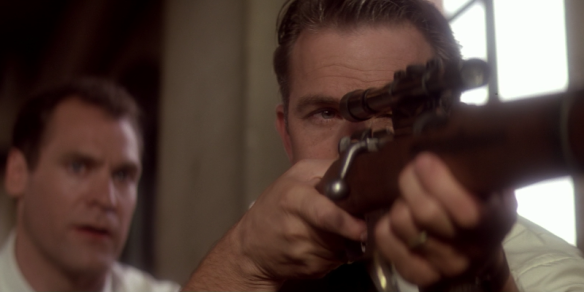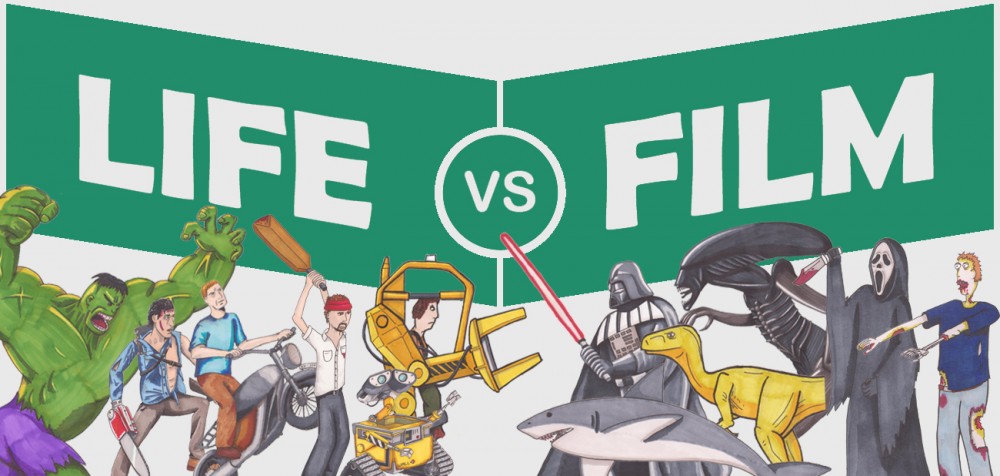On November 22nd, 1963, President John F Kennedy was killed, supposedly by lone gunman Lee Harvey Oswald, who himself was killed by a man named Jack Ruby before the case could go to trial. Despite several other theories, the case was dropped for three years, until Jim Garrison, the District Attorney of New Orleans, picked it up again after noticing some discrepancies within the Warren Report, written to document the details of the assassination. Garrison and his team re-launch the investigation, certain that there is more to it than simply one man and his gun.

I’ve been putting off watching JFK for a long time. I owned it on DVD a few years back, never having seen it before, and then lost the DVD when I moved house. I’ve subsequently bought it again, but didn’t get around to watching it until it was voted Movie of the Month over at the LAMB a few weeks ago, and we held a Lambcast episode devoted to it (which you should definitely listen to, if only because we re-cast the entire film with Muppets). It’s not the first film I’ve bought to watch rather than to enjoy (I still own a copy of The Tree of Life, but that’s only until I have another movie cull), but what’s interesting here is how much I really should like this movie. Heck, you could argue I should love this film, especially going by the cast. It’s full to bursting with actors I’ll happily watch in anything – Kevin Bacon, Gary Oldman, Tommy Lee Jones, Brian Doyle-Murray, Vincent D’Onofrio, Jack Lemmon, Ed Asner, Wayne Knight, Laurie Metcalf, Joe Pesci, Walter Matthau, John Candy, Pruitt Taylor Vince, Donald Sutherland – and I generally don’t even mind Kevin Costner, other than the fact that he always seems to just play Kevin Costner, regardless of the role he’s taking on. No, my problem is the subject matter.

I’ve never much cared for conspiracy theories. Nothing against those who do, it’s just never a topic that’s gripped me. Same with myths and urban legends. I just can’t muster up any enthusiasm to care, and all this film does is pore through the many numerous conspiracy theories behind the JFK assassination. There’s also the matter of this revolving around a very significant moment in American history which, not living in America and not having had it even brought up during my 5 years of History education at school, is not something I’m all that familiar with, outside of references in Mad Men and Seinfeld. These are very much points knocked against myself rather than the movie at hand, but it’s a little background as to why I might not have gelled with Oliver Stone’s film.

Before watching JFK, I’d assumed that almost the entire film would play out as a court case, with Costner’s Jim Garrison bring up point after point, witness after witness, with each one played by a terrific character actor, with grainy flashbacks, recreated footage and the opposition shouting “Objection! Conjecture! Circumstantial evidence!” every few seconds, but in actual fact the courtroom, and the infamous Magic Bullet scene, doesn’t occur until the third hour (yeah, this is a long old movie, another reason it took me so long to get to). Leading up to it we have the events of the day of the assassination, including Jim and his team finding out from the news and rushing to the local bar to watch it on TV, as well as Ed Asner and Jack Lemmon getting into fisticuffs over the affair when a racist, bigoted anti-Kennedy Asner accused Lemmon of being some kind of spy. Then there’s the initial questioning of suspects, such as David Ferrie (Pesci), a pilot whose story is clearly full of holes, and Jack Ruby (Murray), a shady figure all over the place throughout the film. Everything gets blamed on the lone gunman Lee Harvey Oswald (a wonderful Gary Oldman, who really sinks into the role), who was shot and killed by Ruby before he could even go to trial, and the whole affair was tidied away. Three years later, Garrison re-opened the case, sure there was more to it, so set about building his case and questioning everyone involved still alive, wherever they may be, and finds himself uncovering a web of intrigue, conspiracy and confusion.

And when I say confusion, boy do I mean it. The first two-plus hours of JFK are a constant info-dump of names, places, events and allegiances that was exhausting trying to keep straight. I got lost on multiple occasions without any hope of recovering, and had to resort to broad descriptions to stay on top of things. Tommy Lee Jones is the bad guy. He may have worked somehow with Brian Doyle-Murray, Joe Pesci and Kevin Bacon, who at one point is dressed in Elizabethan clothing with Joe Pesci, and is tweaking the nipple of Tommy Lee Jones painted entirely in gold, so that’s something I didn’t expect to see. Everyone else may or may not be involved somehow. I imagine it was supposed to be confusing, what with the whole point being no-one knows the real truth, but this made it unsatisfying, and I felt like a few more viewings would help out a great deal, but when a film is this long who has the time for that?

Performance-wise, when you’ve got so many actors there’s bound to be a weak link here or there. For me, the weakest was Michael Rooker. He played Bill Broussard, one of Jim Garrison’s team (Along with Wayne Knight, Laurie Metcalf, Jay O. Sanders and a few others). I always felt that when he was partaking in a conversation he was always just waiting for the other person to finish talking and it was his turn to say something next, rather than being fully “in” the scene. John Candy also felt a little off, like he was in a different film, but then his character was a bit out there too, so I won’t fault him for that, plus he’s a comic actor taking an early stab at a dramatic role, it was more distracting that it was John Candy than anything else. That’s the problem with a giant cast of recognisable names; they’re such huge stars that they take something away from the film as a whole. When Walter Matthau appeared on a plane next to Costner, I was excited to see him crop up again later, but alas he gets one very short scene, and is never heard from again.

On the other hand, there is some brilliance amongst the cast. Donald Sutherland has one long scene of almost constant dialogue, and it’s wonderful. Tommy Lee Jones was nominated for a Best Supporting Actor Oscar for his portrayal of the effeminate Clay Shaw, and in my book he earned that nomination.

Aesthetically the whole thing is very well implemented too. Like Spielberg’s Lincoln a few years ago, everything looks beautiful despite most of the scenes involving two or more men talking in dusty rooms lit by thin beams of light through cracked windows. A lot of time and effort was also clearly put into the period setting, with everything looking like the 60s, but without ramming it down our throats or making a big thing of it. I could have done without the sub-plot of how Garrison’s obsession was affecting his personal life, with his wife (Sissy Spacek) and kids suffering in many ways. It felt needlessly tacked on and, if it had been intended to play a large part in the film, not enough was done with it. Eschewing that segment would have achieved a more manageable run-time and lost nothing narrative-wise.

All in all, whilst I respect the sheer volume of work that went into this production, ultimately it’s not something I was drawn to. It’s very well made, almost impeccably acted, looks great and taught me a lot, but the subject matter and constant feeling of exposition left me at a distance.
Choose Film 8/10

Pingback: My Week in Movies, 2015 Week 34 | Life Vs Film
Pingback: Blindsided by BELLE ET LA BÊTE | The Matinee | Cinematic Passion & Perspective